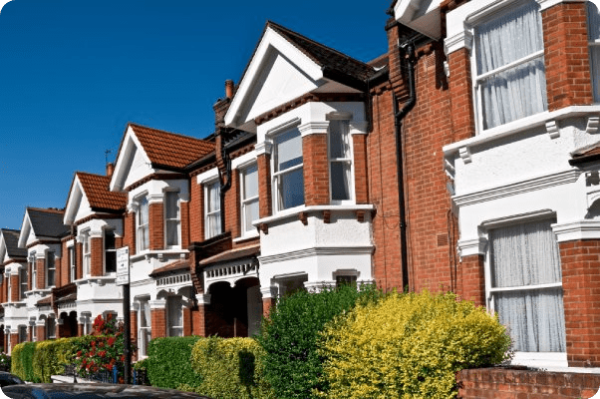10-year fixed rate mortgages
In an unpredictable market, fixing your mortgage rate for 10 years can give you security and stability. Find out everything you need to know to determine if a 10-year fixed rate is right for you.

Free mortgage advice that works for you
Compare our best 10 year fixed mortgage deals
Working out if you should fix your mortgage for 10 years is a big decision.Compare 10-year fixed rate mortgages or speak to one of our expert mortgage brokers to help you find the right option. Your home may be repossessed if you do not keep up repayments on your mortgage.
What is a 10 year fixed rate mortgage?
A 10-year fixed mortgage is a home loan with an interest rate that stays the same for 10 years.
When you take out a mortgage, you’ll be charged interest on the money you’ve borrowed. By choosing a fixed-rate deal, you’ll know exactly what your monthly repayments will be for the length of the term, giving you peace of mind.
No matter what happens to the Bank of England base rate or other market fluctuations, your repayments won’t be affected.
At the end of your 10-year fixed mortgage deal, you can move to a new fixed rate deal, stay on your mortgage lender’s standard variable rate (SVR), or pay your mortgage off in full without penalty.
Fixing your rate for 10 years means you can more easily budget for the future, but such a long fixed rate term isn’t right for everybody.
Can I get a 10-year fixed mortgage?
Longer term mortgages, including 10-year fixed deals, have become increasingly common in the UK due to increased demand from homebuyers for the security they offer.
Although they are widely available, 10-year mortgage rates are generally less common than 2-year fixed-rate or 5-year fixed rate products. This means you will have more choices regarding rates and providers if you’re looking for a shorter-term mortgage.
The acceptance criteria of a 10-year fixed rate mortgage is usually the same as other mortgage terms. However, some providers may look more closely at your financial situation and affordability due to the longer commitment.
Should I get a 10-year fixed rate mortgage?
An important factor is how long you plan to stay in your new home.
For example, if you are buying your forever home, getting a 10-year fixed mortgage rate could be a good option because it’s unlikely you will move house during the fixed rate period.
If you think you’ll want to move within the 10-year period, you might be better off opting for a shorter fixed term. That’s because you usually have to pay an early repayment charge (ERC) to change, which can be very costly - between 1 and 5% of your mortgage balance.
To help you work out if a 10-year mortgage is right for you, let’s take a look at the pros and cons:
Fixed repayments: Your payments will remain the same for 10 years, so no matter what else happens in the economy, what you pay to your mortgage provider won’t change.
Protected against hikes: By locking your interest rate in for a long period, you won’t be affected by inflation or rises in the Bank of England base rate. This means you’ll have peace of mind during times of uncertainty.
Long-term budgeting: Knowing your mortgage outlay will remain the same for a decade means you can more confidently budget for the future.
Fewer fees: As you won’t need to change your deal for 10 years, you won’t have to pay the arrangement fees that come with taking out a new mortgage as often.
Protected against criteria changes: If lenders change their lending criteria and make it more difficult to get a good mortgage rate, you’ll be protected until your deal ends.
Locked in if rates fall: Perhaps the biggest risk of such a long fixed rate period is that you could miss out on cheaper deals if interest rates fall across the board.
Expensive exit fees: If you decide to change mortgage deals or your situation changes, you could face hefty early repayment charges to exit your fixed term.
Higher interest rates: Long-term fixed rates can be more expensive than shorter terms because you are paying for the security of guaranteeing the same rate for a long time.
Less choice: 10-year fixed rate deals are generally less common than shorter terms, so you may have fewer deals and providers to choose from.
Here are the main things to consider when trying to decide whether or not a 10-year mortgage is the right option:
Your financial future: Make sure you’re comfortable with the monthly repayment, and you’re confident you’ll be able to pay it in the future. Are you certain your income will remain at the same level or higher for the mortgage period?
Your future plans: Consider where you see yourself over the next 10 years - if you want to move in the near future then a shorter-term or variable-rate mortgage might be a better option.
The economic outlook: It is worth looking into any interest rate projections - if rates are due to increase then now could be a good time to lock in while they are low.
Talk to a mortgage broker: If you’re still unsure if a 10-year rate is right for you, speak to an expert mortgage broker who can assess your situation and help you make the right choice.
Our expert says...
“10-year fixed rate mortgages are a great option for homebuyers looking for the security of knowing their repayments won’t change for a long time. In these economically turbulent times, protecting yourself from interest rate fluctuations can be a very attractive proposition.
“If you think a 10-year fixed mortgage is the right option, speak to one of our expert brokers today. They’ll be able to talk you through the application process and help you find the right deal.”
10-year fixed rate mortgage FAQs
Most types of mortgages can be available with a 10-year fixed rate, however, some may be harder to find than shorter-term deals.
Repayment: This is the most common type of mortgage, and means you pay off both the balance of your home loan and the interest each month. This means at the end of your full mortgage term you will have paid off everything you’ve borrowed.
Interest-only: With interest-only mortgages, you only pay off the interest you accrue on the amount you borrow. This means you will still owe the balance of your home loan at the end of the term.
Buy-to-let: This type of mortgage is designed specifically for those who buy property to rent out. If you are buying a property for this purpose, you must use a buy-to-let mortgage rather than a standard residential mortgage.
No, you won’t need a bigger deposit for a 10-year fixed mortgage than a shorter-term fixed deal.
However, as with most mortgage products, the larger the deposit you can put down, the better rate you will be offered. If you can it’s always worth considering putting as much towards your mortgage deposit as you can afford.
Not only does this mean you could secure yourself a better deal, but it also means you’ll own more equity in your property from the start. It also means that your loan will be smaller, so your repayments will be lower or it will take less time for you to pay your mortgage off.
Yes, you can remortgage, but you’ll probably need to pay an early repayment charge (ERC) if you choose to.
The amount you’ll be charged will depend on the terms of your product, but generally the closer you are to the end of the term, the lower the fee will be.
For example, the ERC could be 5% of your mortgage balance during the first few years of your term, but gradually reduce to around 1% in the last year or so.
Therefore, you’ll need to work out if the amount you’ll save in interest outweighs the fees you’ll pay for leaving your fixed-rate mortgage early.
It might still be worth it in the long run, but you should speak to your lender about exactly how much it’ll cost you to leave your deal early.
Traditionally, the interest rates attached to 10-year mortgages were higher than shorter terms, however, that is no longer always the case.
Many 10-year deals are currently cheaper than 2 or 5-year fixed rates, due to the volatility of the mortgage market and rising inflation.
However, there are other costs you could face if you have a long-term fixed mortgage. For example, if you need to exit your mortgage early or want to move house, you may face hefty early repayment charges.
On the flip side, you will avoid the fees of arranging a new mortgage deal, as you won’t need to change deals as often.
Should you get a 2 year fixed rate?
Find out about the pros and cons of a 2 year fix
Should you get a 5 year fixed rate?
We break down the pros and cons in our guide
Discover more about remortgaging
Everything you need to know in our remortgage guide
What people are saying about Better.co.uk...
Get a mortgage with Better.co.uk today
Our remortgage customers saved an average of £290 a month in August 2023*
Better.co.uk is a fee-free mortgage broker
5-star Trustpilot rating from over 5,000 reviews
Compare mortgage deals from over 100 lenders
Skip the paperwork: apply online any time
Important info & marketing claims
You may have to pay an early repayment charge to your existing lender if you remortgage. Your savings will depend on personal circumstances.
Your home may be repossessed if you do not keep up repayments on your mortgage.
*The savings figure of £406 is based on Better.co.uk remortgage customers in February 2024. Read more on our marketing claims page.
We can't always guarantee we will be able to help you with your mortgage application depending on your credit history and circumstances.
Average mortgage decision and approval times are based on Better.co.uk's historic data for lenders we submit applications to.
Tracker rates are identified after comparing over 12,000 mortgage products from over 100 mortgage lenders.
As of January 2023, Better.co.uk has access to over 100 lenders. This number is subject to change.
For buy-to-let landlords, there's no guarantee that it will be possible to arrange continuous letting of a property, nor that rental income will be sufficient to meet the cost of the mortgage.
